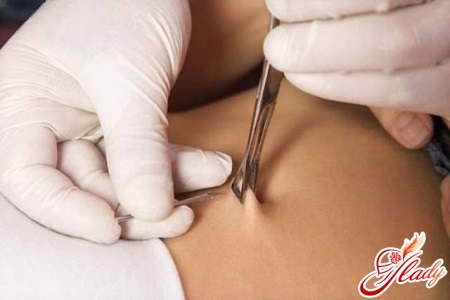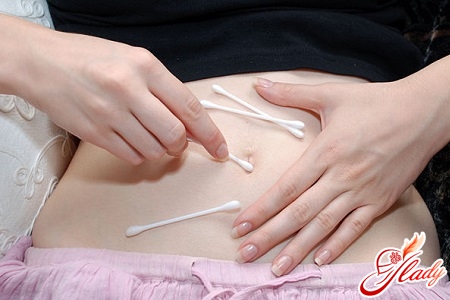
The navel is a scar left to memory ofour prenatal development. It was at this place was the umbilical cord, through which we received nutrients. Few people take care of it until an unpleasant odor comes from the navel. And after all it can speak about the beginning of the most various diseases. The reasons for the appearance of odors can be different, often such an unpleasant phenomenon is accompanied by fluid secretions, irritations, a sense of discomfort. Let's consider, why there can be a smell in the field of a belly-button not only at adults, but also at small children that it is necessary to undertake in that case.
Odor from the navel in children
Unpleasant odor from the navel may not occuronly in adults, but also in young children. But if you bathe the child every day, observe all the rules of hygiene, and the "fragrance" does not disappear, then the discharge is added to it, then the kid should be shown to the doctor to determine the cause, the purpose of the proper treatment. In infants, this phenomenon can accompany the healing of the umbilical ring. In this area, crusts often form, the skin around can be slightly reddened. But the reason why there is such an unpleasant smell, can become full and incomplete fistulas. Incomplete are more common, the navel first becomes wet, then around there are irritations, the fistulas inside are lined with mucous membranes. In addition, fistulas occur in the urinary and bile ducts. In any case, when mucus and unpleasant odor appear from the navel, it is necessary to immediately show the baby to the doctor, in many cases surgical intervention is required, it is impossible to treat at home with traditional medicine alone! One type of fistula during the healing of the umbilical ring is intestinal. At this time, the umbilical cord is already missing, and part of the intestinal wall becomes dead (ligated area). A fistula is formed, from which a rather fetid odor comes. If you do not start the appropriate treatment, then this disease can become chronic, and this will negatively affect the baby's well-being. The most unpleasant and rather dangerous disease that provokes such unpleasant smelling discharge from the umbilical region is omphalitis. This inflammation of the navel is caused by the E. coli and staphylococcus. Today, there are three types of disease: simple, phlegmonous, necrotic. Symptoms of omphalitis are:
- yellowish discharge from the navel;
- redness of the ring;
- unpleasant characteristic odors;
- covering the umbilical area with crusts;
- the temperature of the baby, reaching 37.5-38 degrees.
It is necessary to treat this disease only in conditionshospital, the navel is constantly washed from pus. In difficult cases, surgical intervention is permissible, but with a timely start of treatment this happens rarely. To avoid the occurrence, it is necessary to observe several simple rules for the care of babies:
- to the child it is necessary to approach with cleanly washed hands;
- The first three weeks of diapers and clothes are ironed on both sides;
- change of underwear is made every day;
- after bathing the wound around the navel is handledeach time in this way: first the crusts are removed with a 3% solution of hydrogen peroxide, then the place is dried, a drop of 5 percent potassium permanganate or another antiseptic is applied to it.

Why is the liquid emitted from the navel?
Fetid fragrance from the navel can be accompanied by the appearance of various secretions, most often it is a liquid. The reasons for this may be:

What to do if there is a smell from the navel?
So it is necessary to take, if the liquid starts to ooze from the navel and there is an unpleasant smell, and the reasons for this are not clear? We offer instructions for proper care of the belly button:
- be sure to follow the rules of hygiene, wash at least once a day with mild soap. After showering, rub the navel with a soft napkin, there should not be water left in it;
- deep navel should be cleaned once or twice a weekwith a cotton swab soaked in a disinfectant. For this purpose, chlorhexidine or miramistin is used, fructose, hydrogen peroxide, and fructose are very helpful.
- examine the navel if there is any mud cork in it. Especially often this happens in fat people who have a deep navel. It accumulates dirt, particles of skin, villi from clothing - all this is rolled into a very tight roller that can cause inflammation;
- if you follow the rules for caring for the umbilicus, butdischarge and odor remain, then be sure to consult a doctor. The reasons why this happens can become diseases such as umbilical fistula, urahus cyst, omphalitis, fungal diseases and so on. In any case, consultation of a dermatologist or surgeon is necessary, and they will prescribe the correct and effective treatment.
Stink from the navel is not such a rare phenomenon,as it may seem. Usually, even when it is, very few people think about the reasons for this. But even if you comply with all the rules of hygiene, and the smell still remains, the discharges are attached to it, you need to urgently go to the hospital. This is especially true for young children who have an unpleasant odor accompanied by omphalitis, which requires urgent measures. Therefore, if you find that the smell does not disappear, there is fluid, itching, pain, then do not self-medicate, consult a doctor to determine the cause and treatment.









